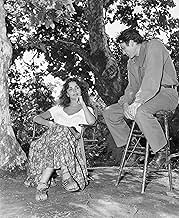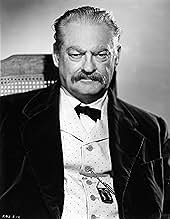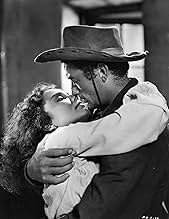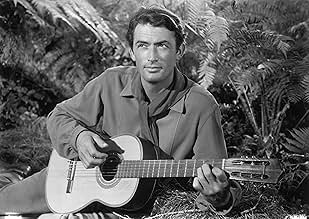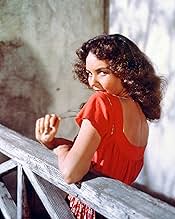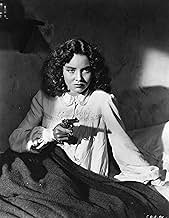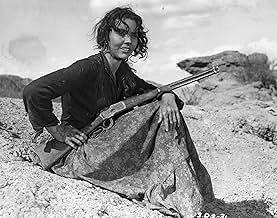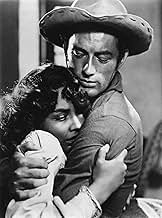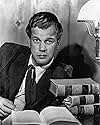ÉVALUATION IMDb
6,7/10
10 k
MA NOTE
La jolie métisse Pearl Chavez devient la pupille du premier amour de son père décédé et se retrouve déchirée entre ses deux fils, l'un bon, l'autre méchant.La jolie métisse Pearl Chavez devient la pupille du premier amour de son père décédé et se retrouve déchirée entre ses deux fils, l'un bon, l'autre méchant.La jolie métisse Pearl Chavez devient la pupille du premier amour de son père décédé et se retrouve déchirée entre ses deux fils, l'un bon, l'autre méchant.
- Nommé pour 2 oscars
- 3 victoires et 4 nominations au total
Griff Barnett
- The Bordertown Jailer
- (uncredited)
John Barton
- Party Guest
- (uncredited)
Avis en vedette
Released in 1946 and directed by King Vidor, "Duel in the Sun" stars Gregory Peck and Joseph Cotton as two rival sons of a ranch baron (Lionel Barrymore) in West Texas in the 1880s. When a striking half-breed (Jennifer Jones) comes to live on the ranch, she inspires love in the mild-mannered, educated son (Cotton) and unpredictable lust in the mocking, wild one (Peck). Lillian Gish plays the mother stuck in the middle while Walter Huston appears as a semi-questionable minister known as The Sinkiller. Charles Bickford is on hand as an older man also interested in the drama mama.
While the movie runs 2 hours and 24 minutes, a full 16 minutes is opening and ending music, which makes the runtime of the story itself just over 2 hours. Speaking of the opening "Prelude" and "Overture," the music (by Dimitri Tiomkin) is thoroughly passé and goes on way too long at 12 minutes before the credits, which last another 1:35. If you can get past that, though, this is a great old Western where the producers pulled out all the stops to entertain. Producer, writer and (uncredited) director David O. Selznick's ambition was to top "King Kong" (1933) and, particularly, "Gone with the Wind" (1939), two other pictures he produced.
Although critics fittingly dubbed it "Lust in the Dust," the movie WAS popular with the masses, no doubt helped by its controversial sexual content (which is tame today) and Selznick's affair with Jones, which broke up both of their marriages. They got married a few years later and it lasted till his death in 1965. Despite its box office success, "Duel" couldn't top "Gone with the Wind" and, being the most expensive film ever made at that point, it only broke even, although it eventually went on to make a profit with a re-release in 1954, etc.
Jones is notable as the heavy-breathing babe, but I personally prefer Joan Tetzel as the fiancé of the older son (Cotton). Also, Peck plays the bad son surprisingly well, considering how he's known for playing more noble protagonists, e.g. "The Big Country" (1958) and "Mackenna's Gold" (1969).
Bottom line: "Duel in the Sun" was just too big of a production to lose. Its story, while decidedly melodramatic, is compelling from beginning to end and there are highlights spiced throughout, including some stunning cinematography, amusing moments with horses and a couple of almost shocking sequences and story turns (e.g. the shootout in the saloon and, later, on the town street). To be expected, there are also some lowlights, but the movie always quickly recovers and maintains its footing. Lastly, there's a valuable moral hidden within the Western soap operatic shenanigans.
The film was shot in Arizona & California (too many places to list). The script was written by David O. Selznick & Oliver H.P. Garrett (and, uncredited, Ben Hecht) suggested by a novel by Niven Busch. ADDITIONAL CAST: Herbert Marshall, Harry Carey, Scott McKay & Butterfly McQueen.
GRADE: A
While the movie runs 2 hours and 24 minutes, a full 16 minutes is opening and ending music, which makes the runtime of the story itself just over 2 hours. Speaking of the opening "Prelude" and "Overture," the music (by Dimitri Tiomkin) is thoroughly passé and goes on way too long at 12 minutes before the credits, which last another 1:35. If you can get past that, though, this is a great old Western where the producers pulled out all the stops to entertain. Producer, writer and (uncredited) director David O. Selznick's ambition was to top "King Kong" (1933) and, particularly, "Gone with the Wind" (1939), two other pictures he produced.
Although critics fittingly dubbed it "Lust in the Dust," the movie WAS popular with the masses, no doubt helped by its controversial sexual content (which is tame today) and Selznick's affair with Jones, which broke up both of their marriages. They got married a few years later and it lasted till his death in 1965. Despite its box office success, "Duel" couldn't top "Gone with the Wind" and, being the most expensive film ever made at that point, it only broke even, although it eventually went on to make a profit with a re-release in 1954, etc.
Jones is notable as the heavy-breathing babe, but I personally prefer Joan Tetzel as the fiancé of the older son (Cotton). Also, Peck plays the bad son surprisingly well, considering how he's known for playing more noble protagonists, e.g. "The Big Country" (1958) and "Mackenna's Gold" (1969).
Bottom line: "Duel in the Sun" was just too big of a production to lose. Its story, while decidedly melodramatic, is compelling from beginning to end and there are highlights spiced throughout, including some stunning cinematography, amusing moments with horses and a couple of almost shocking sequences and story turns (e.g. the shootout in the saloon and, later, on the town street). To be expected, there are also some lowlights, but the movie always quickly recovers and maintains its footing. Lastly, there's a valuable moral hidden within the Western soap operatic shenanigans.
The film was shot in Arizona & California (too many places to list). The script was written by David O. Selznick & Oliver H.P. Garrett (and, uncredited, Ben Hecht) suggested by a novel by Niven Busch. ADDITIONAL CAST: Herbert Marshall, Harry Carey, Scott McKay & Butterfly McQueen.
GRADE: A
not great. only perfect. for the story, mix of different lines. for cast. and for the meet between Jennifer Jones and Gregory Peck in a last scene who impress again and again. it is a masterpiece . for the opportunity to discover a lost age of Hollywood in the best version. for the desire, and the reasonable result, to make a different western. and for its...humanitarian perspective about love and family. sure, I am far to be objective about it as admirer of Lillian Gish and Gregory Peck . but it is real good film. maybe, obvious, perfect.
No need to recap the plot.
One thing about this overblown fandango— once seeing it, you won't forget it. How could anyone when everything is done to such tasteless excess. Poor Pearl (Jones). Apparently, Jones was told her part was that of a hot-blooded wench, which she unfortunately took to mean parboiled. It's hard not to laugh at the first hour when she acts like a nympho on steroids, tossing hair and leering wildly like pampas grass in a windstorm. Not far behind is that vintage ham Lionel Barrymore doing his usual blustery bit, like we won't get his hard-bitten patriarch unless he takes it into hyper speed. And who could have guessed that the usually constricted and constrained Gregory Peck could actually over-act. I think it was his first and last time—good thing, too.
It's possible to go on about the unrelenting excess— the sunsets that appear to hemorrhage, a musical score that's as necessary as sugar on molasses, and a loony ending that defies parody. But you get the idea. Too bad so much money and effort went into such a generally overheated result. Only Cotten, Gish and the black stallion come through unscathed. I'm thinking RKO could have made a dozen worthwhile programmers on the same budget. As things turned out, Selznick did his beloved Jones no favors with this one. It's hard to believe the man responsible for Gone with the Wind (1939) is also responsible for this swollen mess.
One thing about this overblown fandango— once seeing it, you won't forget it. How could anyone when everything is done to such tasteless excess. Poor Pearl (Jones). Apparently, Jones was told her part was that of a hot-blooded wench, which she unfortunately took to mean parboiled. It's hard not to laugh at the first hour when she acts like a nympho on steroids, tossing hair and leering wildly like pampas grass in a windstorm. Not far behind is that vintage ham Lionel Barrymore doing his usual blustery bit, like we won't get his hard-bitten patriarch unless he takes it into hyper speed. And who could have guessed that the usually constricted and constrained Gregory Peck could actually over-act. I think it was his first and last time—good thing, too.
It's possible to go on about the unrelenting excess— the sunsets that appear to hemorrhage, a musical score that's as necessary as sugar on molasses, and a loony ending that defies parody. But you get the idea. Too bad so much money and effort went into such a generally overheated result. Only Cotten, Gish and the black stallion come through unscathed. I'm thinking RKO could have made a dozen worthwhile programmers on the same budget. As things turned out, Selznick did his beloved Jones no favors with this one. It's hard to believe the man responsible for Gone with the Wind (1939) is also responsible for this swollen mess.
Well, it's obvious that Selznick was trying his best to recapture that GWTW magic...but this is an unbelievably inept failure. Here's what you can expect from this overblown sex-western:
--Jennifer Jones (in pancake make-up so orange that she put me more in mind of an Oompa-Loompa than the half-breed we're supposed to see) apparently directed to act as though she's Scarlett O'Hara with a lobotomy and bad grammar.
--Gregory Peck as rogue murdering rapist and the apple of his daddy's eye. At one point even doing a pretty decent vocal imitation of Clark Gable -- too bad it's just the voice.
--Lionel Barrymore lazily repeating his "It's a Wonderful Life" role from the same year -- wheelchair & grumpiness standing in for effort.
--Butterfly McQueen as kerchiefed ditzy maid. Hmmm, wonder where they got that idea?
All in all, a miserable movie experience. You'd think that since they cribbed from the best it'd have turned out better! Go figure.
--Jennifer Jones (in pancake make-up so orange that she put me more in mind of an Oompa-Loompa than the half-breed we're supposed to see) apparently directed to act as though she's Scarlett O'Hara with a lobotomy and bad grammar.
--Gregory Peck as rogue murdering rapist and the apple of his daddy's eye. At one point even doing a pretty decent vocal imitation of Clark Gable -- too bad it's just the voice.
--Lionel Barrymore lazily repeating his "It's a Wonderful Life" role from the same year -- wheelchair & grumpiness standing in for effort.
--Butterfly McQueen as kerchiefed ditzy maid. Hmmm, wonder where they got that idea?
All in all, a miserable movie experience. You'd think that since they cribbed from the best it'd have turned out better! Go figure.
PURE OPERA. From the scenic backdrops seething in passionate colors to Jennifer Jones' over-ripe performance and Dimitri Tiomkin's tempestuous score...'Duel In The Sun' isn't just another soapy oater, it is the ultimate soapy oater. Brimming with more bad taste than any screenwriter could possibly misconceive, this Selznick classic is the penultimate guilty viewing pleasure...if you like you're Westerns on the sleazy side that is!
The performances are all unapologetically over-the-top, with Ms. Jones, in an Oscar winning performance no less, as Pearl Chavez, the 'half-breed' vixen torn between lust for Gregory Peck's Lewt McCanles, the bad-boy brother gone badder, and the 'save-me-from-myself' brand of love for Joseph Cotten's Jesse McCanles, the good brother with not-a-whole-heck-of-alot of sex appeal going for him. In between all this indecision, Ms. Jones sets fire to the scenery with as many sultry leers and poses as, I suppose, the censors of the time would permit her. "I'm TRASH, TRASH, TRASH," Pearl exclaims. And that about sums it all up. In spades! I should also make mention of the other Oscar winning performance, that by the venerable Lillian Gish as Laura Belle McCanles who, in perhaps the most painfully rapturous sequence, resurrects her silent film training in a tour-de-force of physical acting that, in less capable hands, would only be embarrassing. Not that you won't be tempted to laugh mind you, even Grand Opera, at the best of times, isn't this exquisitely sublime. And then there is Butterfly McQueen...as the befuddled maid (what else)...in the only role written for obvious comedic effect, whose long-winded sincerity couldn't be the more perfect foil for a hurried house full of whitees with nothing but sex on the brain...
On the technical side, it is an unquestionably ravishing film to look at. In glorious Technicolor, the 'Old West' never looked more mythic or more prone to tragedy...the 'campy' side that is. And, yet once more, Dimitri Tiomkin finesses our ears with a resounding melody of wide open spaces and of still bigger ambitions and desires, culminating in a symphonic tempest for two ill-fated (or over-sexed) lovers who could only be united in death.
WOW, this picture is right off the Harlequin Romance map! And I enjoyed every minute of it.
The performances are all unapologetically over-the-top, with Ms. Jones, in an Oscar winning performance no less, as Pearl Chavez, the 'half-breed' vixen torn between lust for Gregory Peck's Lewt McCanles, the bad-boy brother gone badder, and the 'save-me-from-myself' brand of love for Joseph Cotten's Jesse McCanles, the good brother with not-a-whole-heck-of-alot of sex appeal going for him. In between all this indecision, Ms. Jones sets fire to the scenery with as many sultry leers and poses as, I suppose, the censors of the time would permit her. "I'm TRASH, TRASH, TRASH," Pearl exclaims. And that about sums it all up. In spades! I should also make mention of the other Oscar winning performance, that by the venerable Lillian Gish as Laura Belle McCanles who, in perhaps the most painfully rapturous sequence, resurrects her silent film training in a tour-de-force of physical acting that, in less capable hands, would only be embarrassing. Not that you won't be tempted to laugh mind you, even Grand Opera, at the best of times, isn't this exquisitely sublime. And then there is Butterfly McQueen...as the befuddled maid (what else)...in the only role written for obvious comedic effect, whose long-winded sincerity couldn't be the more perfect foil for a hurried house full of whitees with nothing but sex on the brain...
On the technical side, it is an unquestionably ravishing film to look at. In glorious Technicolor, the 'Old West' never looked more mythic or more prone to tragedy...the 'campy' side that is. And, yet once more, Dimitri Tiomkin finesses our ears with a resounding melody of wide open spaces and of still bigger ambitions and desires, culminating in a symphonic tempest for two ill-fated (or over-sexed) lovers who could only be united in death.
WOW, this picture is right off the Harlequin Romance map! And I enjoyed every minute of it.
Le saviez-vous
- AnecdotesAccording to King Vidor, director Josef von Sternberg was hired only as a lighting expert by David O. Selznick in order to give his wife--and the film's star--Jennifer Jones a more glamorous look.
- GaffesThe opening shows saguaro cacti in the valley. The film is supposed to take place in Texas, but southern Arizona is the only place in the US with saguaro cacti, unless they've been transplanted.
- Citations
The Sinkiller: Under that heathen blanket, there's a full-blossomed woman built by the devil to drive men crazy.
- Autres versionsThe original "roadshow" version ran 144 minutes. The additional 16 minutes, over the commonly-shown 128 minute version, consisted of a musical "prelude," an "overture" (which contained a spoken prologue, by Orson Welles), and exit music, but no additional scenes in the film. The two additional opening sequences were each inadvertently given the other's label.
- ConnexionsEdited into Histoire(s) du cinéma: Une histoire seule (1989)
Meilleurs choix
Connectez-vous pour évaluer et surveiller les recommandations personnalisées
Détails
Box-office
- Budget
- 8 000 000 $ US (estimation)
- Brut – États-Unis et Canada
- 20 408 163 $ US
- Brut – à l'échelle mondiale
- 20 428 771 $ US
- Durée2 heures 26 minutes
- Rapport de forme
- 1.37 : 1
Contribuer à cette page
Suggérer une modification ou ajouter du contenu manquant

Lacune principale
By what name was Duel in the Sun (1946) officially released in India in English?
Répondre

